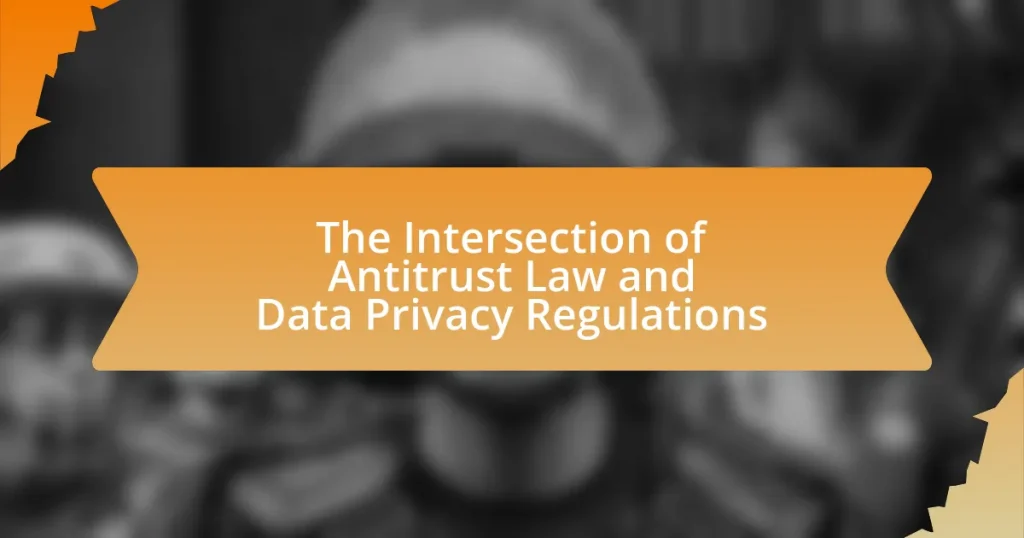The article focuses on the future of antitrust enforcement, particularly in relation to large technology companies, highlighting a trend towards increased regulatory scrutiny and more aggressive measures. It examines how recent judicial opinions have shaped antitrust laws, emphasizing consumer welfare and market competition, with key cases such as United States v. Google and Facebook, Inc. v. Federal Trade Commission serving as pivotal examples. The article also discusses the implications of these judicial interpretations for businesses, the evolving challenges in antitrust litigation, and the importance of compliance with antitrust laws to foster competition and innovation in the marketplace. Additionally, it addresses the role of international cooperation in antitrust enforcement and the varying approaches different countries take towards these issues.

What is the Future of Antitrust Enforcement?
The future of antitrust enforcement is likely to involve increased scrutiny of large technology companies and a shift towards more aggressive regulatory measures. Recent judicial opinions indicate a trend towards interpreting antitrust laws in a manner that prioritizes consumer welfare and market competition, as seen in cases like United States v. Google, where the court emphasized the need to address monopolistic practices. This evolving landscape suggests that regulators will adopt a more proactive stance, utilizing both traditional antitrust frameworks and new legislative tools to combat anti-competitive behavior effectively.
How have recent judicial opinions shaped antitrust enforcement?
Recent judicial opinions have significantly shaped antitrust enforcement by clarifying legal standards and influencing the interpretation of competitive practices. For instance, the Supreme Court’s decision in the 2021 case of “Facebook, Inc. v. Federal Trade Commission” reinforced the need for plaintiffs to demonstrate specific anticompetitive harm, thereby tightening the criteria for antitrust claims. Additionally, rulings in lower courts have emphasized the importance of market definition and the role of consumer welfare in assessing mergers and acquisitions, as seen in the “United States v. AT&T Inc.” case, where the court upheld the merger by focusing on potential consumer benefits. These judicial interpretations guide enforcement agencies in their approach to antitrust investigations and litigation, ultimately shaping the landscape of competition law in the United States.
What key cases have influenced current antitrust laws?
Key cases that have influenced current antitrust laws include United States v. Standard Oil Co. (1911), which established the “rule of reason” for evaluating monopolistic practices, and United States v. Microsoft Corp. (2001), which addressed anti-competitive behavior in the software market. The Standard Oil case set a precedent for assessing whether a company’s actions unreasonably restrain trade, while the Microsoft case highlighted the importance of maintaining competition in technology markets. These rulings have shaped the framework for antitrust enforcement and continue to inform judicial opinions and regulatory approaches today.
How do these cases reflect changing economic landscapes?
Recent judicial opinions in antitrust cases reflect changing economic landscapes by emphasizing the need for updated regulatory frameworks that address modern market dynamics. For instance, the rise of digital platforms has prompted courts to reconsider traditional antitrust principles, as seen in cases involving major tech companies where market dominance is evaluated through new metrics like data control and network effects. This shift indicates a recognition that conventional measures of competition may not adequately capture the complexities of today’s economy, where innovation and consumer choice are heavily influenced by technology. The increasing scrutiny of mergers and acquisitions in tech sectors further illustrates this trend, as regulators aim to prevent anti-competitive practices that could stifle innovation and harm consumers.
Why is antitrust enforcement important for market competition?
Antitrust enforcement is crucial for market competition because it prevents monopolistic practices that can stifle innovation and consumer choice. By regulating anti-competitive behavior, antitrust laws ensure that multiple firms can compete fairly, which leads to better prices, improved products, and increased services for consumers. Historical data shows that markets with robust antitrust enforcement, such as the United States during the late 20th century, experienced significant technological advancements and consumer benefits, highlighting the positive impact of competition on economic growth.
What role does antitrust play in consumer protection?
Antitrust plays a crucial role in consumer protection by promoting competition and preventing monopolistic practices that can harm consumers. By enforcing antitrust laws, regulatory bodies aim to ensure that markets remain open and competitive, which leads to lower prices, improved quality of goods and services, and greater innovation. For instance, the Sherman Act of 1890 and the Clayton Act of 1914 are foundational antitrust laws in the United States that prohibit anti-competitive agreements and practices. Studies have shown that effective antitrust enforcement can lead to significant consumer savings; for example, a report by the Federal Trade Commission indicated that competition in the telecommunications market resulted in billions of dollars in savings for consumers. Thus, antitrust enforcement is essential for safeguarding consumer interests and maintaining a healthy economic environment.
How does antitrust enforcement impact innovation?
Antitrust enforcement impacts innovation by promoting competition, which incentivizes firms to innovate to maintain or enhance their market position. When antitrust laws are effectively enforced, they prevent monopolistic practices that can stifle competition and reduce the motivation for companies to develop new products or improve existing ones. For instance, a study by the National Bureau of Economic Research found that increased competition leads to higher rates of innovation, as firms strive to differentiate themselves in a competitive market. This dynamic illustrates that robust antitrust enforcement can create an environment where innovation flourishes, benefiting consumers and the economy as a whole.

What are the emerging trends in antitrust enforcement?
Emerging trends in antitrust enforcement include increased scrutiny of digital markets, a focus on consumer welfare, and the application of novel legal theories. Regulatory bodies, such as the Federal Trade Commission and the Department of Justice in the United States, are prioritizing cases against large technology companies, reflecting concerns over monopolistic practices and data privacy. For instance, the rise of cases against companies like Google and Facebook illustrates a shift towards addressing anti-competitive behavior in the tech sector. Additionally, recent judicial opinions emphasize the importance of market definition and the potential harm to competition, indicating a more aggressive stance on mergers and acquisitions that could stifle competition. These trends are supported by a growing body of legal precedents that advocate for a more proactive approach to antitrust enforcement in rapidly evolving markets.
How are technology companies being scrutinized under antitrust laws?
Technology companies are being scrutinized under antitrust laws through increased regulatory investigations and lawsuits aimed at preventing anti-competitive practices. For instance, the U.S. Department of Justice and several state attorneys general have filed lawsuits against major tech firms like Google and Facebook, alleging monopolistic behavior that stifles competition and harms consumers. These legal actions are based on findings that these companies have engaged in practices such as predatory pricing, exclusive contracts, and acquisitions that eliminate potential competitors, which violate established antitrust principles. The scrutiny reflects a growing concern among regulators about the market dominance of these firms and its implications for innovation and consumer choice.
What specific practices are being challenged in the tech industry?
Specific practices being challenged in the tech industry include anti-competitive behavior, data privacy violations, and monopolistic practices. Antitrust regulators are scrutinizing major tech companies for engaging in practices that stifle competition, such as predatory pricing and exclusive contracts that limit market access for smaller firms. For instance, the U.S. Department of Justice’s lawsuit against Google in 2020 highlighted concerns over its dominance in online search and advertising, which allegedly harms competition and innovation. Additionally, issues surrounding user data handling have led to increased regulatory attention, as seen in the European Union’s General Data Protection Regulation, which imposes strict guidelines on data privacy and user consent.
How do these challenges differ from traditional industries?
The challenges in antitrust enforcement differ from traditional industries primarily due to the rapid pace of technological innovation and the complexity of digital markets. Unlike traditional industries, where competition is often based on physical goods and straightforward market dynamics, digital markets involve intricate algorithms, network effects, and data-driven strategies that can create monopolistic behaviors more subtly. For instance, in traditional industries, market share can be easily quantified through sales volume, whereas in digital platforms, dominance may stem from user engagement metrics and data control, complicating the assessment of competitive practices. This complexity necessitates a more nuanced understanding of market behavior and consumer impact, as evidenced by recent judicial opinions that highlight the need for updated legal frameworks to address these unique challenges effectively.
What role does international law play in antitrust enforcement?
International law plays a crucial role in antitrust enforcement by providing a framework for cooperation among countries to address anti-competitive practices that cross borders. This framework is essential because many corporations operate globally, and their actions can affect competition in multiple jurisdictions. For instance, treaties and agreements, such as the OECD Guidelines for Multinational Enterprises, facilitate collaboration between nations in investigating and prosecuting antitrust violations. Additionally, international law helps harmonize antitrust standards, allowing for more effective enforcement and reducing the risk of conflicting regulations. The effectiveness of international cooperation is evidenced by cases like the 2019 enforcement actions against Google, where multiple jurisdictions coordinated their efforts to address anti-competitive behavior, demonstrating the importance of international legal frameworks in modern antitrust enforcement.
How do different countries approach antitrust issues?
Different countries approach antitrust issues through varying legal frameworks and enforcement strategies. For instance, the United States employs a consumer welfare standard, focusing on the effects of business practices on consumer prices and choices, as evidenced by the Sherman Act and the Federal Trade Commission Act. In contrast, the European Union utilizes a more interventionist approach, emphasizing market competition and consumer protection, as reflected in the EU Competition Law, particularly Articles 101 and 102 of the Treaty on the Functioning of the European Union. Additionally, countries like Japan and South Korea have adopted unique frameworks that blend elements from both the U.S. and EU systems, focusing on both consumer welfare and market structure. These differences illustrate how cultural, economic, and political factors shape antitrust enforcement globally.
What are the implications of international cooperation on enforcement?
International cooperation on enforcement enhances the effectiveness of antitrust regulations by enabling countries to share information, resources, and best practices. This collaboration leads to more comprehensive investigations and the ability to address anti-competitive behavior that crosses borders. For instance, the European Union and the United States have engaged in joint investigations, which have resulted in significant penalties for multinational corporations involved in anti-competitive practices. Such cooperation not only increases the deterrent effect of enforcement actions but also fosters a more consistent application of antitrust laws globally, reducing the risk of regulatory arbitrage.

What insights can be drawn from recent judicial opinions?
Recent judicial opinions reveal a trend towards stricter scrutiny of monopolistic practices and a more aggressive stance on antitrust enforcement. Courts are increasingly emphasizing consumer welfare and market competition, as seen in cases like the United States v. Google, where the court highlighted the importance of maintaining competitive markets to prevent harm to consumers. This shift indicates a potential for more rigorous enforcement actions against large corporations, reflecting a growing judicial recognition of the need to curb anti-competitive behavior in the digital economy.
How have judicial opinions clarified antitrust standards?
Judicial opinions have clarified antitrust standards by establishing key legal precedents that define anti-competitive behavior and the thresholds for enforcement. For instance, the Supreme Court’s decision in the 2007 case of Leegin Creative Leather Products, Inc. v. PSKS, Inc. shifted the standard for vertical price restraints from a per se illegal framework to a rule of reason analysis, allowing for a more nuanced evaluation of market effects. This ruling emphasized the importance of considering the actual impact on competition rather than relying solely on rigid classifications. Additionally, the 2018 case of Ohio v. American Express Co. further clarified the standards by ruling that anti-steering provisions in credit card agreements did not violate antitrust laws, as they were found to promote competition in the market. These judicial opinions provide a clearer understanding of how courts interpret antitrust laws, influencing both enforcement practices and business conduct in competitive markets.
What are the implications of these clarifications for businesses?
The implications of these clarifications for businesses include a heightened need for compliance with antitrust laws and a potential shift in competitive strategies. Businesses must now navigate a more defined legal landscape, which may lead to increased scrutiny from regulators. For instance, recent judicial opinions have clarified the standards for assessing anti-competitive behavior, compelling companies to reassess their pricing strategies and market conduct to avoid legal repercussions. This shift could result in a more cautious approach to mergers and acquisitions, as firms may face greater challenges in justifying their market positions. Additionally, businesses may need to invest in legal resources to ensure adherence to these evolving standards, thereby impacting operational costs and strategic planning.
How do these opinions affect future litigation strategies?
Recent judicial opinions significantly influence future litigation strategies by establishing precedents that shape legal interpretations and enforcement approaches in antitrust cases. These opinions clarify the standards for assessing anti-competitive behavior, which can lead to more targeted litigation strategies that align with the evolving legal landscape. For instance, rulings that emphasize the importance of market definition and consumer harm may prompt litigators to focus on these elements more rigorously in their cases. Additionally, the outcomes of these opinions can inform the risk assessments that companies undertake when considering mergers or business practices, ultimately guiding their legal strategies to either pursue or defend against antitrust claims.
What challenges do courts face in antitrust cases?
Courts face significant challenges in antitrust cases, primarily due to the complexity of economic theories and the difficulty in assessing market power. These challenges arise from the need to analyze intricate market dynamics, which often require expert testimony and economic modeling to establish whether anti-competitive behavior exists. For instance, the 2018 Supreme Court case, Ohio v. American Express, highlighted the difficulty courts encounter in balancing pro-competitive benefits against anti-competitive harms, illustrating the nuanced nature of antitrust analysis. Additionally, courts must navigate varying interpretations of antitrust laws, which can lead to inconsistent rulings and uncertainty in enforcement. This complexity is compounded by the rapid evolution of technology and market structures, making it challenging for courts to apply traditional antitrust principles effectively.
How do courts balance economic theories with legal standards?
Courts balance economic theories with legal standards by evaluating the implications of economic principles within the framework of existing laws. This process involves analyzing how economic theories, such as market competition and consumer welfare, align with statutory provisions and judicial precedents. For instance, in antitrust cases, courts often reference economic models to assess whether business practices harm competition, while simultaneously adhering to legal standards set by statutes like the Sherman Act. This dual approach ensures that economic insights inform legal interpretations, allowing for decisions that reflect both market realities and legal obligations.
What are the common pitfalls in antitrust litigation?
Common pitfalls in antitrust litigation include insufficient evidence to support claims, failure to properly define relevant markets, and overlooking the complexities of economic analysis. Insufficient evidence often leads to dismissal of cases, as courts require robust data to substantiate allegations of anti-competitive behavior. Additionally, failing to accurately define relevant markets can result in misinterpretation of competitive dynamics, undermining the case’s foundation. Economic analysis is crucial; neglecting this aspect can lead to flawed arguments regarding market power and consumer harm, which are central to antitrust claims. These pitfalls have been highlighted in various judicial opinions, emphasizing the need for thorough preparation and expert testimony in antitrust cases.
What practical steps can businesses take in light of recent opinions?
Businesses can enhance compliance with antitrust laws by conducting thorough audits of their practices and policies. This involves reviewing pricing strategies, market share, and competitive behavior to ensure alignment with recent judicial opinions that emphasize stricter enforcement of antitrust regulations. For instance, the U.S. Supreme Court’s decision in “Ohio v. American Express” highlighted the importance of evaluating market power and consumer welfare, prompting businesses to reassess their market strategies to avoid potential legal challenges. Additionally, companies should invest in training programs for employees on antitrust compliance, fostering a culture of awareness and adherence to legal standards. Implementing these steps can mitigate risks associated with antitrust violations and align business practices with evolving legal expectations.
How can companies ensure compliance with antitrust laws?
Companies can ensure compliance with antitrust laws by implementing robust compliance programs that include regular training, monitoring, and legal audits. These programs should educate employees about antitrust regulations, promote ethical business practices, and establish clear reporting mechanisms for potential violations. For instance, the Federal Trade Commission emphasizes the importance of proactive compliance measures, which can help prevent anti-competitive behavior and mitigate legal risks. Additionally, companies can consult legal experts to review business practices and ensure alignment with current antitrust laws, as seen in cases where companies that proactively sought legal advice were able to avoid significant penalties.
What best practices should businesses adopt to avoid litigation?
Businesses should adopt clear compliance programs and regular training to avoid litigation. Implementing robust policies that align with antitrust laws can significantly reduce the risk of legal disputes. For instance, companies that conduct regular audits and assessments of their business practices are better equipped to identify potential legal issues before they escalate. According to a study by the American Bar Association, organizations with comprehensive compliance programs experience 50% fewer legal disputes compared to those without such measures. Additionally, fostering a culture of transparency and ethical behavior within the organization can further mitigate risks associated with litigation.



